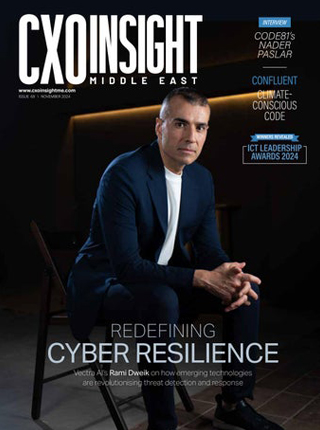The rise of digitalisation and the widespread adoption of remote work are redefining how industries operate, shifting from traditional models to more agile, technology-driven approaches. For businesses, these trends are no longer optional—they are essential for maintaining a competitive edge. Nowhere is this transformation more apparent than in the Middle East, where ambitious initiatives like Saudi Arabia’s Vision 2030 and the UAE’s Centennial 2071 are creating fertile ground for the adoption of advanced technologies. The region’s emphasis on innovation, coupled with its strategic focus on diversifying economies, makes it uniquely positioned to capitalise on solutions such as remote connectivity, artificial intelligence (AI), and augmented reality (AR). As industries like oil & gas, manufacturing, healthcare, and logistics adapt to this new reality, the Middle East is emerging as a hotspot for companies driving digital transformation—and TeamViewer is one of the key players enabling this shift.
The need for robust remote access solutions has grown exponentially in the region, fuelled by the drive for operational efficiency, cost reduction, and enhanced flexibility. According to Saed Habash, Channel Director Middle East & Africa, TeamViewer, this shift is being embraced across industries, from oil & gas to healthcare.
“Remote access technology in the Middle East is evolving rapidly, driven by digital transformation initiatives across key sectors,” he explains. “In oil & gas, for instance, remote access is crucial for monitoring and troubleshooting equipment in remote locations, which helps minimise downtime and reduce costs. Healthcare organisations are using remote access for telemedicine, remote diagnostics, and managing medical devices. Similarly, in manufacturing and logistics, companies are relying on these tools for maintenance, troubleshooting, and optimising supply chain operations.”
What’s driving this shift, Habash notes, isn’t just the immediate need to ensure business continuity in unpredictable times. It’s also about reshaping how businesses operate, with remote access becoming a long-term strategic enabler for growth and efficiency.
Security remains key
As hybrid work models gain ground in the Middle East, cybersecurity has become a critical concern for businesses transitioning to more flexible environments. Ensuring that remote sessions are secure and reliable is one of TeamViewer’s top priorities.
“Cybersecurity remains a top priority, especially as hybrid work environments continue to grow,” Habash emphasises. “At TeamViewer, we take a multi-layered approach to security, incorporating end-to-end encryption, two-factor authentication, and compliance with global data protection regulations such as GDPR and SOC 2. We ensure our solutions are designed to offer secure, encrypted connections for every remote session, whether employees are working from the office, home, or a remote site.”
Proactive threat monitoring and regular updates are at the core of TeamViewer’s approach to staying ahead of emerging cybersecurity risks. For companies navigating hybrid work environments, this focus on security provides peace of mind while enabling them to embrace the flexibility of remote work.
AI’s growing role
In industries where operational downtime can result in significant losses, AI is becoming a game-changer. TeamViewer has integrated AI into its solutions to optimise remote support and maintenance processes, making them faster, smarter, and more proactive.
“A key part of our AI integration is predictive maintenance tools, which analyse real-time data to identify potential equipment failures before they happen,” Habash shares. “This allows companies to take proactive measures, reducing downtime and preventing costly repairs. Our AI-enhanced remote support features also help technicians by automating routine diagnostics and offering actionable insights, enabling them to resolve issues faster and with greater accuracy.”
What sets TeamViewer apart in this space is its emphasis on collaboration between human expertise and AI. “Rather than replacing human expertise, our AI solutions are designed to work alongside technicians, offering data-driven insights and automating repetitive tasks to speed up issue resolution. This collaboration between human expertise and AI leads to better outcomes.”
For industries like oil & gas, logistics, and manufacturing, where workers often operate in remote or high-risk environments, augmented reality is transforming how tasks are performed. TeamViewer’s AR platform, Frontline, is empowering frontline workers by giving them real-time, hands-free guidance, reducing errors, and boosting efficiency.
“TeamViewer Frontline provides step-by-step visual instructions directly on mobile devices or smart glasses, helping workers complete complex tasks more efficiently,” Habash explains. “For example, a worker in a manufacturing facility can use AR to view overlay instructions on a piece of equipment while performing maintenance. They can also receive real-time remote assistance from experts, reducing the likelihood of errors and minimising the need for on-site experts, which can be costly and time-consuming.”
The ability to overlay visual instructions and troubleshoot in real-time not only improves operational efficiency but also ensures worker safety. “AR guides workers through potentially hazardous tasks, ensuring they follow best practices,” Habash adds.
While the potential of remote access, AI, and AR is vast, adopting these technologies isn’t always seamless—particularly for frontline workers who may not have advanced technical expertise. Habash acknowledges these challenges and explains how TeamViewer is ensuring smooth adoption.
“Frontline workers often have limited technical expertise, so digital solutions must be intuitive, easy to use, and seamlessly integrate into their daily workflows,” he says. “TeamViewer Frontline is designed to be simple to use, providing clear, step-by-step instructions and visual aids so workers can get up and running quickly.”
He also highlights the importance of reliability in challenging environments. “We ensure that our solutions work even in environments with limited or unreliable internet connectivity, such as remote oil & gas sites or rural logistics hubs. Flexibility and customisation are key—we work closely with our customers to tailor our solutions to their specific needs.”
Looking ahead
As the Middle East continues its transformation into a hub of innovation and technology, the role of advanced solutions like remote access, AI, and AR will only grow. TeamViewer’s commitment to enabling businesses to operate more efficiently, safely, and sustainably positions it as a key player in the region’s digital transformation journey.
“Ultimately, our goal is to help organisations unlock their full potential,” Habash concludes. “Whether it’s through AI-powered predictive maintenance, secure remote access, or AR-driven frontline solutions, we’re here to support businesses in the Middle East as they shape a connected and innovative future.”
With industries in the region rapidly embracing digitalisation, the path ahead looks promising. TeamViewer’s innovative solutions are not just meeting today’s demands but also shaping the future of work across the Middle East.










Discussion about this post